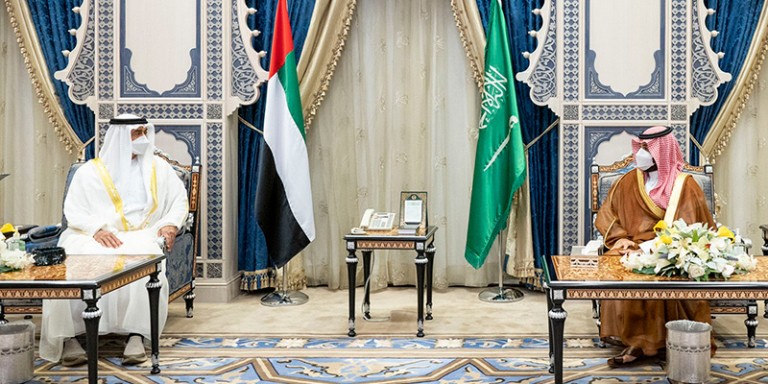
The Gulf Cooperation Council (GCC) appears to be approaching another unwelcome rift, this time between its two most vocal and influential members, Saudi Arabia and the United Arab Emirates. The two were instrumental in 2017 in imposing a deleterious three-and-a-half-year blockade of a fellow GCC member, Qatar, damaging the council as both a security entente and an economic powerhouse of similar rentier states. What came to be known as the Gulf crisis was tepidly resolved at the 41st GCC summit meeting in January 2021 in the Saudi Arabian city al-Ula, although relations between the original instigators of the blockade—Saudi Arabia, Bahrain, the UAE, and Egypt—and Qatar have yet to fully return to normal. Like that dispute, a rift between Saudi Arabia and the UAE now may cause irreparable harm to the GCC, which faces serious economic and geopolitical challenges that cannot be addressed without unity, coordination, and cooperation.
Over the last few days, Saudi Arabia and the UAE found themselves at loggerheads on two serious economic fronts. On Monday, Saudi Arabia announced a change in rules on imports from other GCC states, a policy that would seriously impact goods produced by companies operating in free economic zones, or containing Israeli input. Free zones are hubs that the UAE has used for at least two decades to import knowhow and attract foreign direct investment. The new rules remove such goods from preferential treatment at Saudi entry points, as GCC economic cooperation stipulates. The fact that the UAE is Saudi Arabia’s second trading partner after China indicates that the kingdom is serious about challenging the UAE’s ascendant economic agenda in the region while also taking a swipe at Abu Dhabi’s unabashed flaunting of ties with Israel.
Saudi Arabia and the UAE also presented divergent views during the last OPEC+ virtual meeting to organize oil output and pricing for the next six months and into 2022. The kingdom led members in a proposal to increase oil production beginning in August by monthly installments of 400,000 barrels per day (bpd), to reach a two-million bpd boost by the end of 2021. Output cuts decided in 2020 would remain in effect through 2022. The UAE objected to the proposal, with its Minister of Energy and Infrastructure Suhail Al Mazrouei saying the deal was not satisfactory and insisting on increasing his country’s quota of oil production. The meeting broke up without agreement, including on when it will be reconvened.
Given the UAE’s recent record of freewheeling and independent decision-making, it is not hard to imagine that a disagreement with Saudi Arabia on oil production could lead to an Emirati flight from OPEC and subsequently distancing itself from the purported common interests of all GCC states. The UAE’s departure would be different from Qatar’s at the beginning of 2019 when, as the peninsular nation was under a blockade that was engineered by its closest neighbors, it produced only about 600,000 bpd and wanted to focus on its gas production. Doha’s decision to leave OPEC did not affect the cartel’s policies or output. On the other hand, the UAE’s share as of March 2021 was 3.6 million bpd and thus its departure would have serious consequences.
The Saudi-Emirati spat on economic issues has a political and strategic edge to it as well. Over the last three years, the UAE has not shied away from taking its self-interested path on region-wide issues, especially in Yemen, which Saudi Arabia considers to be its backyard and where it is enmeshed in what is increasingly becoming a long-term geostrategic quagmire. The UAE has supported the Yemeni secessionist Southern Transitional Council, which is anathema to Saudi interests in a unified Yemen. Abu Dhabi is also engaged in setting up economic and military bases in Yemen’s Socotra Archipelago and Mayyun (Perim) Island in the Bab al-Mandab waterway.
Additionally, the UAE is extending its influence to the Horn of Africa by building alliances and economic relations that would impact Saudi interests in the region. Lately, the UAE has made serious inroads with Somalia’s breakaway states of Somaliland and Puntland, in the process helping the dissolution of the federal Somali state. Indeed, despite appearances to the contrary, Saudi Arabia is seeing a challenger and competitor next door whose transgressions should sooner or later be addressed.
Will the newest spat in the GCC—this time between its arguably most influential members— lead to a serious rift akin to the one that resulted after ostracizing Qatar in June 2017? With ambitious leaders and strongmen like Crown Prince Mohammed bin Salman of Saudi Arabia and Abu Dhabi’s Crown Prince Mohammed bin Zayed at the helm, such a rift may be too deep and consequential to heal. Saudi Arabia and the UAE must be aware of the dangers of allowing slightly divergent interests to become the basis for doing away with the common interests of the GCC that, only last month, celebrated its founding 40 years ago.

